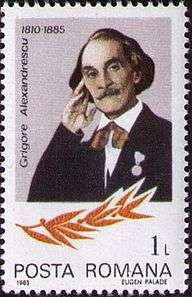Grigore Alexandrescu

Grigore Alexandrescu (February 22, 1810, Târgovişte – November 25, 1885) in Bucharest was a nineteenth-century Romanian poet and translator noted for his fables with political undertones.
Of a noble family, he participated in secret revolutionary societies. In his fables his political and social views were often reflected satirically and ironically often on the uneasiness of living under the Russian protectorate. His works such as Tombs at Drăgăşani were particularly nationalist and patriotic in nature.[1]
He founded a periodical, Albina Româneascǎ. Alexandrescu wrote Poezii (1832, 1838, 1839) and Meditaţii (1863), many of which were fables and satires influenced by French literature.[2]
Works (summary)
- Poezii (1832)
- Fabule (1832)
- Meditații (1835)
- Poezii (1838)
- Fabule (1838)
- Poezii (1839)
- Memorial (1842)
- Poezii (1842)
- Suvenire și impresii, epistole și fabule (1847)
- Meditații, elegii, epistole, satire și fabule (1863)
References
- ↑ Columbia Encyclopedia Sixth Edition (2007) Retrieved on March 18, 2008
- ↑ Encyclopædia Britannica, Retrieved on March 18, 2008
External links
| Wikimedia Commons has media related to Grigore Alexandrescu. |
- Works by or about Grigore Alexandrescu at Internet Archive
- Works by Grigore Alexandrescu at LibriVox (public domain audiobooks)

This article is issued from Wikipedia - version of the 4/6/2016. The text is available under the Creative Commons Attribution/Share Alike but additional terms may apply for the media files.